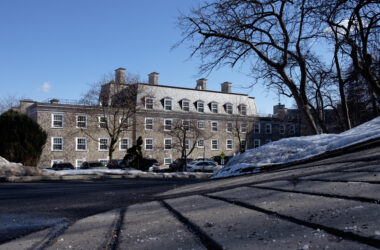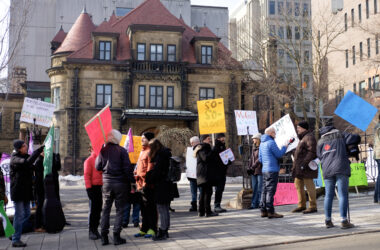How would you evaluate your year as the SSMU president?
With every year, there are certainly ups and downs. I think that the great things we were able to achieve far surpassed the others which individuals might consider to be not so successful. This year featured the very first student-run homecoming, and the revival of Faculty Olympics. We saw our very first equity conference hosted by the equity committee, we had a forum on undergraduate education. Clearly, I think it was an extremely successful year.
What did you learn from the events surrounding the closing of the Architecture café?
Something I took out of it is that if the administration is really bent on something, that it’s very difficult to change its mind. I think the whole issue regarding the Architecture Café was a really bittersweet one. We lost the café that was loved by a lot of people, even if not occupied by many. But out of it we got this really great group. And the administration of this university has on the forefront of its mind the importance of communication and consultation with every member of McGill. Perhaps we lost the battle to win the war.
What thoughts do you have about your push for GA reform?
I wish the Legislative Council did what its job was, which is to deliberate on items that are coming before it, rather than referring everything to committees. We talked a lot about consultation throughout the year and I’m the culprit in creating a buzzword. There is merit in consultation, but one needs to prove why one needs further consultation before making calls for it. There’s also this notion that committees are always better suited to solve challenges, which I don’t think is necessarily the case.
What I think was really great about this referendum question is that it got people talking seriously for the first time about, ‘Is the General Assembly democratic? Is the General Assembly something we admire? And, if we’re going to change it, what would be the model that people would be the most interested in developing?’ And that conversation had never really happened before outside of the newspaper.
Looking back, what thoughts do you have about the events surrounding and the process of Jobbook?
Personally, I think that Jobbook is going to be a great tool for students. At every opportunity I disclosed my potential for conflict to the relevant decision-making bodies; there was never any withholding of information to that end. In my mind, this is an instance where there may be a perceived conflict of interest that was managed in accordance with the conflict of interest policy and I’d go further in saying these really are parallel interests, not conflicts. It is both in the interest of the Society and Jobbook.
I’m disappointed that some members of the executive chose to bring a motion to remove before a Legislative Council rather than addressing the issue with me beforehand and I wish that they had also consulted the Society’s lawyer on this issue before making false accusations.
How did Jobbook divide the Executive Committee during its last few months in office?
I think that we did a very good job at hiding our differences in public during the first semester. But it’s very clear that second semester our dirty laundry was put out before everyone to see.
Do you have any thoughts on the campus media’s characterization of you throughout the Jobbook saga?
I think certain media sources decided to take the very lazy route. It’s very easy to assume bad will and to criticize and to bring someone down. I think the more difficult task is to see that the situation is not entirely black or white, that certainly there are times when individuals have bad intentions, but that there should also be consideration for goodwill along the way and I think that was totally in every way disregarded by some sources.
The media coverage was very surprising. It’s interesting in the first place that documents that were confidential were leaked and that members of the Executive and Council were commenting on a confidential issue, which is a breach of confidentiality and yet no sanctions were imposed on them.
Do you have any advice for Maggie Knight and next year’s SSMU exec?
The one piece of advice that I would give is that it’s very easy to adhere to ideologies. However, I don’t think adhering to ideologies is something that will make individuals successful. Many of the Society’s policies are in many ways uncompromisingly ideological, and if the Society is going to be successful, we’re going to need to step beyond those ideologies and make meaningful, thoughtful, and intentional decisions for the betterment of student life at McGill.
The president is the face of the Society. [Knight] is going to be the one who speaks to the media, who’s out there in front of students giving presentations or speeches, or whatever it is. She’s going to be the one whom people look to. And balancing that with making sure the rest of the team is on board along the way is definitely a challenging task, but I think they’re blessed in the coming year that they have a group of individuals who seem to be cohesive and seem to be ready for whatever will come their way.








